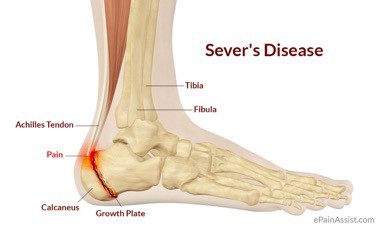Calcaneal apophysitis is a painful inflammation of the heel’s growth plate (physis). It typically affects developing athletes and children between the ages of 8 and 14 years old, and is usually related with a growth spurt. This condition is often caused by overuse of tendons and repetitive stress to the growth plate of the calcaneus in the heel. This is usually due to repetitive heel movement as seen while playing sports, especially those involving running. In growing children, excessive weight bearing on the heel bone (calcaneus) causes excessive traction as the bones and tendons are still developing and are still soft; resulting in muscle strain and inflamed tissue. It affects both the heels in 50% of the patients and is the most common cause of heel pain in children. Other potential causes of calcaneal apophysitis include obesity, a tight Achilles tendon, and biomechanical problems such as flatfoot or a high-arched foot. Symptoms of calcaneal apophysitis may include: pain in the back or bottom of the heel especially when/after running or walking, limping, walking on toes, difficulty running, jumping, or participating in usual activities or sports and reduced range of motion in the ankle.
